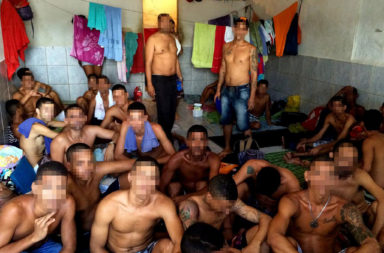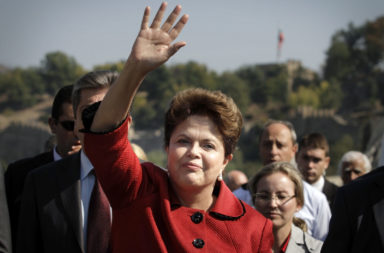President Dilma Rousseff’s chances of remaining in office sinked after the largest political party of her government left her coalition. Isolated and with almost no forces to react against, Ms. Rousseff will be facing a voting at the Chamber of Deputies that will probably decide to impeach her. The current vote is whether to send the president to trial, and the impeachment vote is on Sunday. She even accused her vice president of organizing this “coup” against her!
While the world´s attention starts to look to Brazil for the Olympic Games, the political turmoil, economic crisis and the government´s actions against the Zika virus have the potential to outshine the big event, to be held in August.
With breaking news changing the political landscape almost every day, the following list will help you understand what is going on, which mistakes led to this situation and why Ms. Rousseff will likely face an impeachment:
- A weak executive in a presidential system
With the end of the economic boom of the last decade, Brazil’s president, Dilma Rousseff, has made several interventions in the economy to create jobs and control inflation, freezing energy and gas prices. The unpopular measures needed to save the economy were expected to be implemented before 2014, but the electoral year meant that the government could not adopt these tough measures, thus putting the Brazilian economy at risk.
- A fragile coalition
After a tight result in the elections, Ms. Rousseff was unable to build a strong coalition in her second term in office. Her fraught relations with Congress in her first term led the coalition to demand more posts in the federal government. With a false illusion that she could turn the situation in her favor alone, Ms. Rousseff left important members of the coalition aside and appointed a hawkish finance minister to conduct the necessary economic reforms.
- A growing corruption scandal
The Lava-Jato case has been referred to as the Brazilian “Mani pulite” several times, a reference to the Italian operation held in the 1990s that resulted in the disappearance of many political parties and held half of the members of the Parliament under indictment. In general terms, the operation is revealing how Brazilian companies conduct business transactions with the government. The investigation has been ongoing for two years but its main findings arose only in the last few months. While corruption was affecting only congressmen from members in the government coalition and some few cases in the opposition parties, the executive got a false perception that the crisis would only affect the legislative members.
- Popular demonstrations
Right after Ms. Rousseff´s inauguration, several movements opposed to the government took the streets to protest, blaming the government for ubiquitous corruption. They started big in March 2015, but lost strength during the year. The corruption scandal started affecting some important figures in the country: the presidents of both houses in Congress were involved in a scandal involving the state-controlled oil company Petrobras.
- Do not mess with the speaker of the Lower House
Eduardo Cunha, a skilled politician ruling the House of Representatives, has declared war on Ms. Rousseff´s administration. The Brazilian constitution grants the speaker of the lower house the right to decide whether to open an impeachment procedure against the government or not. In that sense, Mr. Cunha had the president’s political fate in his hands for several months during 2015.
- “I’d rather be impeached than support corruption”
Mr. Cunha was going through an investigation in the Ethics Comission in Congress over his suitability to stay in power even with the investigations against him going on. Blackmailing the support of the government for votes in his favor at the comission, Mr. Cunha decided to open the impeachment process after Ms. Rousseff´s Working Party (PT) annouced its will to overthrow him.
- Bye bye, investment grade
While the political crisis was deepening, the finance minister was not able to fully implement its consolidation strategy that needed Congress’ approval. Standard & Poor’s, followed by Fitch and Moody’s, downgraded the Brazilian economy to a level below the investment grade. This great shock provoked the finance minister’s resignation and increased the dissatisfaction both in the streets and within the members of Congress.
- Trying to keep control of the situation
With the impeachment becoming a real threat, Ms. Rousseff decided to give more ministerial posts to the government coalition parties and removed her right-hand man from his post as her chief of staff. That strategy was mostly designed by the former president Lula, who suggested that Ms. Rousseff would need to show a real change of direction if she were to keep her position. The new ministerial design gave more space to the biggest party under the government coalition (PMDB) and to Mr. Lula.
- Calm before the storm
The ministerial reform seemed to work. With smaller demonstrations in the streets and a relative confidence that the government would have the 172 votes to get rid of the impeachment threat for good, the government ended 2015 with a false hope that 2016 would bring better days.
- Lava-Jato strikes again
Meanwhile, the Lava-Jato operation, in only a few months, managed to reach key figures that dragged the presidency to the center of the corruption storm. The imprisoning of the leader of the Workers Party at the Senate, Mr. Delcídio do Amaral, under the allegiance of trying to interfere in the Lava-Jato investigation, made him negotiate a plea bargaining agreement with the Federal Police. In his testimony, he accused the former president Lula and Ms. Rousseff of being aware of the Petrobras wrongdoings. Meanwhile, the investigation also jailed João Santana, responsible for Mr. Lula and Ms. Rousseff´s political campaigns, accusing him of receiving money from Petrobras to promote their political campaigns.
- All eyes on former president Lula
With a deepening of the political crisis, the 25th phase of the Lava-Jato operation took into custody Mr. Lula – a still dominant political figure in Brazil – to testify against corruption charges. Claiming that the corruption investigation was biased only towards the Workers Party members, Mr. Lula and Ms. Rousseff decided to react against the judiciary.
- Lula is back. But not for long…
Less than two weeks after Lula´s testimony, Ms. Rousseff appointed him as his chief of staff. As a State Minister, Lula would then be judged by the Supreme Court, and not by Sergio Moro, the Justice responsible for the Lava-Jato. More than ten judges in many states issued injunctions to keep Lula from taking power.
- Brazilian Wikileaks
In the same day, A federal judge, Sergio Moro made public some taped phone conversations between Mr. Lula and Ms. Rousseff, in which both talk about Lula’s position as chief of staff. Mr. Moro accused them of obstruction of justice, while both the presidents accused the head of the investigations of leaking biased information. Ms. Rousseff accused Moro of going way beyond his competences, since taping the president without the Supreme Court´s approval is a federal crime.
- The streets strike again. For both sides.
The constant breaking news over the scandal and the leaked conversations of the former president managed to put more than three million people on the streets of the major Brazilian cities, both for and against the government. Extremely polarized, public opinion is demanding answers over the political future of the country.
- Is there a way out?
In Congress, the impeachment commission appointed its members last week. Over the next months, the Congress will make a political judgement whether Ms. Rousseff should stay in power or not. Without any concrete proof of her personal involvement on the Petrobras scandal, her supporters are calling the impeachment a coup, while its opponents claim that the political crisis will only be solved by her resignation or eventual impeachment.
What happens next in Brazil?
In the case of a political impeachment or a resignation, Mr. Michel Temer (from PMDB) would assume as the position of interim president. After leading its party away from the government´s coalition, the vice-president is negotiating with the major opposition party a transition government which would last until the presidential elections of 2018. However, PT will remain the second biggest party in Congress, and a post-impeachment scenario would not necessarely mean the end of the crisis.
Part of the corruption investigations claims that irregular money from Petrobras was used to finance the presidential campaign of both Ms. Rousseff and Mr. Temer in 2014. If proven, this argument would remove both from office. The third in line is currently Mr. Cunha, who is waiting to be judged by the Supreme Court. After him, the fourth in line is the president of Senate, also said to be involved in the wrongdoings. If confirmed and both Rousseff and Temer leave the executive office, new elections would be called, either direct (if they leave before 2017) or indirect (after 1st of January).
In any case, Ms. Rousseff will likely not finish her term in office. Whether it will take longer or not, the only way out of this crisis seems to be the voice of the streets: not with chanting against or supporting the government, but at the polls.




